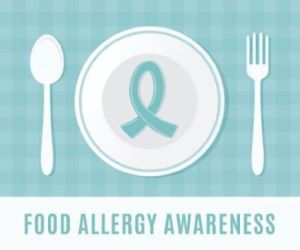
Food Allergy Awareness Month is almost over but we have exciting news to share: The Food Allergy Safety, Treatment and Education Research (FASTER) Act of 2021 has been passed into law! What does that mean for patients with food allergies? It means that sesame will now join dairy, eggs, wheat, soy, peanuts, tree nuts, fish, and shellfish as one of the top 9 most common food allergies.
Food Allergy Basics
Food allergies effects 1 in 13 children in the US and, unfortunately, have been on the rise. In fact, they have increased by 50% between 1997 and 2011 with the prevalence of peanut and tree nut almost tripling during this timeframe. A food allergy is when your body causes a harmful reaction to a food protein. Basically, your immune system attacks a food protein that is harmless. Food allergy reactions can range from hives to more life-threatening symptoms such as facial swelling, difficulty breathing, and hypotension. This systemic reaction is called anaphylaxis. Children with food allergies must always carry or have immediate access to the life-saving medication epinephrine as this is the only treatment for anaphylaxis.
Food allergies have a significant impact on quality of life for children and their families. They create stress and anxiety when eating outside the home such as at school, friends’ houses, and restaurants. Many children report being bullied or not believed about their food allergy. Having food allergies can lead to social isolation.
Is There a Cure?
Right now, there is no cure for food allergies. Children need to avoid the foods they have reacted to and follow closely with an allergist/immunologist. Many children will outgrow egg, dairy, soy, and wheat allergies, but only 20% will outgrow peanut allergy with even less outgrowing tree nuts, finish, shellfish, and sesame allergy.
Although there is no cure for food allergies, there are immunotherapy treatments that have recently been approved and some on the horizon. The goal of these treatments is to lessen the severity of a reaction should your child have an accidental ingestion. Palforzia is the only FDA approved oral treatment for peanut allergy, but there are ongoing studies looking at skin patches, sublingual tablets and drops.
FASTER Act
Sesame allergies are on the rise exponentially. Like other major food allergens, it can cause serious reactions and this allergy is unlikely to be outgrown. This law requires sesame be labeled by a common and recognizable name and listed as an ingredient on all packaged foods. This will make it easier to tell if the food is safe to eat for those with sesame allergy.
We’re Here for You!
The Phoenix Children's Hospital Allergy & Immunology Clinic offers assessment and testing for those with known or suspected food allergy. We regularly perform food “challenges” in our clinic as a safe means to ultimately determine if a food is safe for your child. For immunotherapy, we offer the FDA-approved peanut treatment, Palforzia, and other food immunotherapy on a research basis. Contact us if your child has a known or suspected food allergy. We’d love to help!
